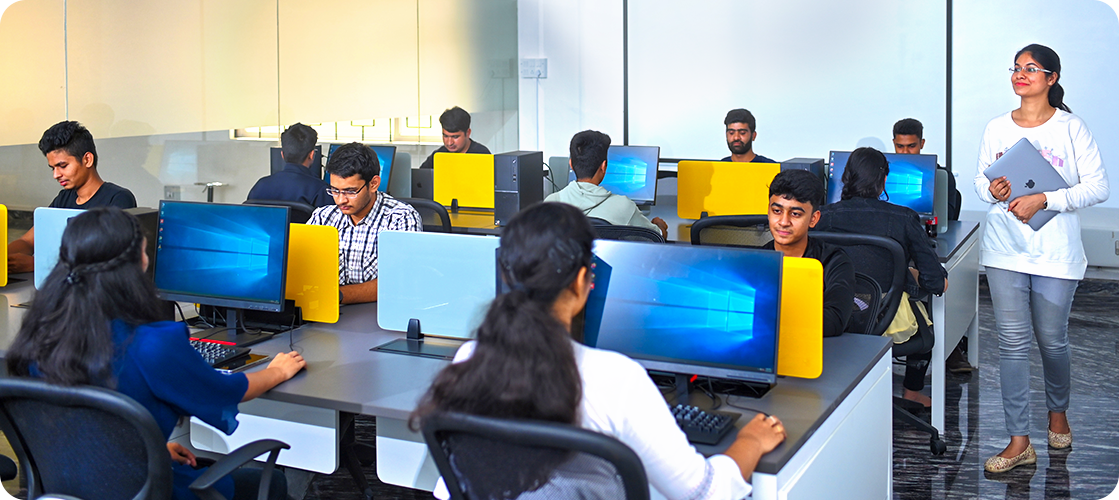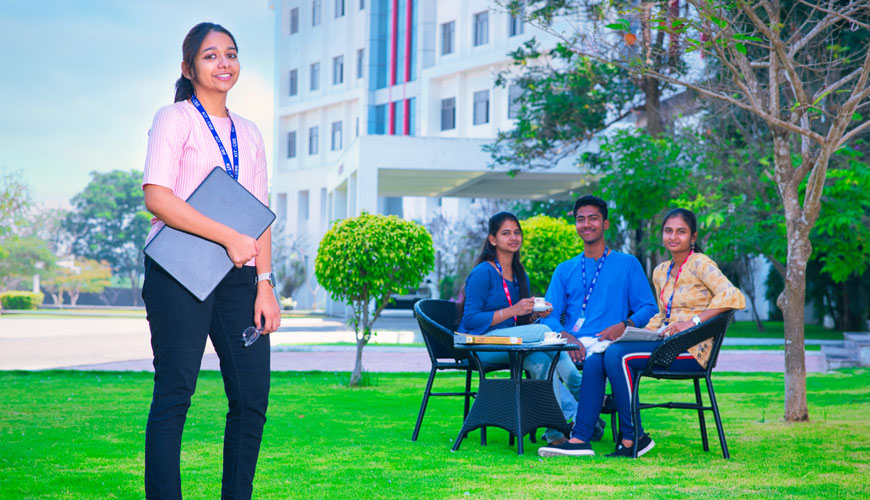A COURSE THAT FOCUSES ON THE ELEMENTS OF COMPUTER PROGRAMMING AND NETWORKING.

The Department caters to the ever- growing technology in the sphere of academic, research and training needs of computing concepts, tools and techniques. The Department of Computer Science is an elite department known for its forward-looking approach to higher education and innovative teaching for producing competent software professionals.
"The Department of Computer Science and Engineering (CSE) is dedicated to shaping the future by offering an education that is not only innovative but also of the highest standard. Our relentless pursuit of academic excellence is driven by a team of distinguished and passionate faculty members, committed to nurturing young minds and preparing them to excel in a global arena. We provide a dynamic platform where students are empowered to unlock their full potential and realize their career aspirations. I warmly invite you to be a part of this transformative journey as we continue to elevate the Department of CSE to new pinnacles of success and distinction."
Dr.S.Raja Mohamed
– Head of the Department
The department offers the following courses:
After the successful completion of the U.G. programme in Computer Science and Engineering, Graduates will be able to:
After the successful completion of the U.G. programme in Computer Science and Engineering, Graduates will be able to:
After the successful completion of the P.G. programme in Computer Science and Engineering, Graduates will be able to:
After the successful completion of the P.G. programme in Computer Science and Engineering, Graduates will be able to:
Academic
Labs with Centre of Excellence
BoS Members
| S.No | Name | Category |
|---|---|---|
| 1 |
Dr.K.Kumar Professor / CSE Government of College of Technology, Burgur. |
University Nominee |
| 2 |
Dr.R.Dhanalakshmi Associate Professor & HoD / CSE IIIT, Trichirapalli. |
Subject Expert 1 other than parent university |
| 3 |
Dr.T.Senthil Kumar Professor / CSE Amrita School of Engineering, Coimbatore. |
Subject Expert 2 other than parent university |
| 4 |
Mr.R.Venkatesan Project Manager Ebix Inc, Coimbatore. |
Industry Expert |
| 5 |
Mr.A.Praveen Raj Technical Solutions Delivery Engineer Ocient. |
PG Alumnus |

| S.No | Name | Qualification | Designation |
|---|---|---|---|
| 1 | Dr.S.Vimal | M.E, Ph.D | Professor & Dean |
| 2 | Dr.S.Raja Mohamed | M.E, Ph.D | Associate Professor & HoD |
| 3 | Dr.S.Santhi | M.E, Ph.D | Professor |
| 4 | Dr.K.Mahalakshmi | M.Tech, Ph.D | Professor |
| 5 | Dr.K.Deeba | M.Tech, Ph.D | Professor |
| 6 | Dr.S.Dhanabal | M.E, Ph.D | Professor |
| 7 | Dr.C.Suresh | M.E, Ph.D | Associate professor |
| 8 | Dr.S.Pandiarajan | M.Tech, Ph.D | Assistant professor |
| 9 | Ms.M.Jayanthi | M.E, (Ph.D) | Assistant professor |
| 10 | Ms.S.Deepa | M.E, (Ph.D) | Assistant professor |
| 11 | Mr.V.M.Prabhakaran | M.E | Assistant Professor |
| 12 | Ms.R.Renugadevi | M.E, (Ph.D) | Assistant professor |
| 13 | Dr.J.Senthil Kumar | M.E, Ph.D | Assistant professor |
| 14 | Ms.R.Sumathy | M.E, (Ph.D) | Assistant professor |
| 15 | Ms.R.Sasikala | M.E | Assistant professor |
| 16 | Ms.M.Revathy | M.Tech, (Ph.D) | Assistant professor |
| 17 | Ms.A.Yuvarani | M.E | Assistant Professor |
| 18 | Ms.Gokilapriya S | M.E | Assistant Professor |
| 19 | Ms.P.Malathi | M.E | Assistant professor |
| 20 | Ms.T.Amsaveni | M.E | Assistant professor |
| 21 | Mr.K.Vijayarajasekaran | M.E | Assistant Professor |
| 22 | Ms.S.Varalakshmi | M.E | Assistant Professor |
| 23 | Ms.M.Thabathi | M.E | Assistant Professor |
| 24 | Mr.S.Selvin Rajeshkumar | M.E | Assistant Professor |
